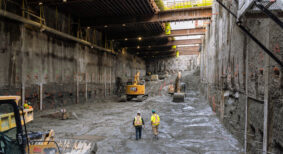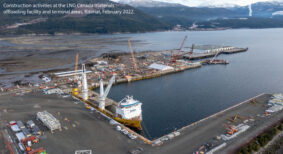As the Alberta construction industry continues to deal with the evolving COVID-19 crisis, the McLennan Ross Construction Group is working hard to stay ahead of the legal challenges that this unprecedented situation poses to clients.
The group has prepared answers to the most frequently asked COVID-19 questions that affect the Alberta construction industry. Here are five:
Should I just shut my project down?
Shutting down the worksite (as opposed to just removing particular workers as described above) may put companies at risk of breaching various contractual obligations. For example, removing workers who carry no recognizable risk may result in financial loss to those workers and corresponding risk of liability to the party shutting down the site.
Fortunately for the construction industry, layoff and termination notice or pay in lieu of notice is not required under the Employment Standards Code for employees employed at the site of and in the construction, erection, repair, remodelling, alteration, painting, interior decoration or demolition of any building or structure. However, office employees and maintenance employees are entitled to layoff notice and termination notice. Layoff notice is required for 1 week if employed less than 2 years, 2 weeks if employed for 2 years or more, or if unforeseeable circumstances prevent such notice, then as much notice as practicable. Termination notice may be required for office or maintenance employees up to 8 weeks (if employed more than 10 years). Notice may not apply if unforeseeable or unpreventable circumstances make it impossible to give termination notice.
Employees employed for a definite term or task are also exempted from the group termination provisions of the Employment Standards Code.
On a unionized worksite, the collective agreements would govern in respect to layoff and termination obligations.
Every contract up and down the chain should be considered, to determine if shutting down the project can be legally justified – particularly in light of the provisions relating to delay and force majeure as well as the concept of frustration, all discussed below. The decision to shut down the project without legal justification may attract liability for breach of contract. However, it may be possible to amicably negotiate contract revisions where parties have a common interest in taking such actions.
Can contractors or owners claim delay damages or an extension of time as a result of COVID-19?
Most construction contracts expressly set out the relief for delay-related impacts, such as an extension of time to complete the work and possible recovery of costs and damages. In many cases, delays caused by external factors such as COVID-19 will be excusable but not compensable to the contractor, but this may vary from one contract to the next. The delay provisions likely require that the contractor mitigate any losses caused by the delay, and in any event the common law requires the parties to act reasonably if it is possible to reduce or avoid such costs.
Where you are party to multiple agreements related to the work or project (including but not limited to leases, development or financing agreements, subcontracts, supply contracts, and equipment rental contracts), it is important to assess whether you are protected against the consequences of any delays in respect of each contract, as they may not be aligned or consistent. It is also important to take note and comply with all contractual notice requirements.
Will a force majeure clause relieve me of my contractual obligations?
A force majeure clause is common in certain construction contracts and normally frees the parties from liability or obligation when an extraordinary event or circumstance beyond either party’s control prevents one or all of the parties from fulfilling their contractual obligations.
Force majeure clauses are read very narrowly. The triggering event must clearly fall within the scope of the force majeure clause. Further, the application of a force majeure clause requires that the triggering event is clearly beyond the control of the contracting parties; and the triggering event must render performance of contractual obligations impossible. Simple inconvenience or the fact that an event is beyond someone’s control will likely not be sufficient to render a force majeure provision applicable.
COVID-19 will certainly trigger some force majeure clauses; however, a case-by-case assessment is required. As the impact of COVID-19 and legislative responses continue to evolve, it is prudent to ensure that you understand the specific nature of your contractual arrangements to determine whether a force majeure clause exists and may be relied upon in your particular circumstances.
Further contractual considerations can be found by clicking here.
Will the concept of frustration of contract absolve me of my contractual obligations on a project?
The doctrine of frustration may apply where the force majeure provisions in the construction contract are not met (or such provisions do not exist). The distinguishing feature of frustration is that it is not based on any provision of the contract, whereas relief for force majeure must be explicitly set out in the contract. The common law rule of frustration may apply to absolve the parties to a construction contract of their obligations entirely. The rule is applied narrowly where the obligations of the parties are truly impossible to perform because of a third party. For example, frustration will not apply where the contract is merely more expensive or more onerous to perform, or where an alternative method of performance is possible. Unless you have a mass outbreak at the worksite, or the authorities shut the worksite down, it would likely be difficult to prove frustration. This is not to say that a construction contract cannot be terminated for frustration as a result of COVID-19, but it is unlikely and will need to be assessed on a case-by-case basis.
If we are required to shut our project down, will losses be covered by business interruption insurance?
Business interruption coverage only applies if the loss is caused by an insured peril. COVID-19 is likely not a peril covered by the typical business interruption insurance carried by construction companies. There are several important restrictions on business interruption coverage and, like other types of insurance, the specific policy language must be reviewed to determine if there is coverage for pandemics or epidemics. An important consideration to keep in mind is that most business interruption policies will provide coverage only when physical loss or damage has been caused to the insured’s premises or property used in the operation of the business.
Some package policies from insurers may have some limited “outbreak expense coverage,” but this will most likely be for a nominal amount and only apply with respect to ”confirmed”, not ”suspected”, exposure.
Specialty coverage for disruption of business due to a pandemic does exist. But the number of companies that have this type of coverage is limited, given that the coverage has always been expensive and limited in scope. It is important that you keep complete accounting and financial documentation, review your policy, and speak to your insurance broker to confirm whether you have insurance coverage in such circumstances.
More on business interruption insurance can be found by clicking here.
The above is excerpted with permission from McLennan Ross LLP. The full 10 construction industry Q&A can be found at here. For more COVID-19 updates, visit https://mross.com/law/covid-19.









